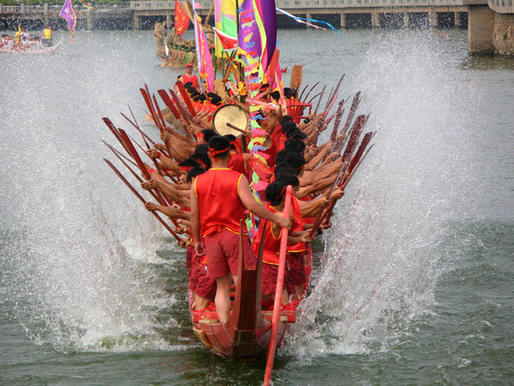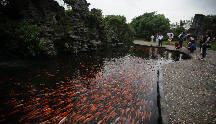Racing the Dragons in Yueyang
Racing the Dragons in Yueyang
By staff reporter JIAO FENG & AI JIE
THE fifth day of the fifth moon on the Chinese lunar calendar is the Duanwu Festival of the Han people. It's known as the Dragon Boat Festival in English, because on that day people in riverine or lakeside communities will hold dragon boat races. The day was originally dedicated to famous ancient poet Qu Yuan (340-278 B.C.). History has it that Qu Yuan was an aristocrat of Chu, one of the vassal states during the Warring States Period (475-221 B.C.). He was exiled to Hunan as a political dissident. After the State of Chu was defeated and annexed, the poet, to show his loyalty to his state, threw himself into the Miluo River and drowned. The locals, who admired his noble act of patriotism, rowed their boats out on the river dropping rice balls as they went, to feed the fish and shrimps so they wouldn't nibble at Qu Yuan's body. This gesture of good will has evolved into a commemorative annual tradition of eating zongzi (steamed glutinous rice wrapped in leaves to form a pyramid shape) and holding dragon boat races that day.
Yueyang City in northeastern Hunan is where the Miluo River joins Dongting Lake, and the city is the origin of the dragon boat race. In the 1980s the municipal government promoted this folk tradition into an international event and has since hosted it on its Nanhu Lake every fifth day of the fifth lunar moon. Over the past three decades, the Yueyang International Dragon Boat Festival has signed up an increasing number of foreign participants, and the China National Tourism Administration has listed it as a regular folklore event recommended for foreign tourists.
Yueyang is also a famous destination that dates back to ancient China and has many tourism attractions. Yueyang Tower, Junshan Mountain and Dongting Lake are iconic sites, rich in both historic and cultural significance.
 |
|
The dragon rips through the water. |
Conventions and Customs
Because the Duanwu, alias Duanyang, Festival is one of the major traditional celebrations of the Han Chinese people there are many other must-do's of the day besides eating zongzi and cheering on, or participating in, the dragon boat race. Though activities vary from place to place, some observances are common, such as hanging calamus and mugwort on doors, wearing a sachet on the body, and drinking realgar wine.
In the early hotter days arriving with the fifth moon (in June on the Gregorian calendar) flies and mosquitoes start to proliferate. Ancient Chinese found that calamus and mugwort drive away these annoying bugs, so every family hung a bunch of such herbs on their door. People would also take a mugwort bath on the day to ease skin irritations and dispel pathogens so they would stay safe and sound for the rest of the summer. Dexterous housewives would sew the colorful sachets and bind the herbs into them; these were worn on the body as perfume or put into wardrobes and clothes chests to ward off mildew and vermin.
The Duanwu ushers in a time of year when cold-blooded creatures such as snakes and centipedes become active and dangerously aggressive toward humans. Realgar is a traditional Chinese medicinal ingredient thought to neutralize natural poisons, as such it was used to treat insect bites and even as an antidote to snake venom. Ancient Chinese ground realgar into powder and put the powder into wine. Drinking the realgar wine, applying it to the foreheads and necks of their children, and spraying it on walls and in corners, kept away the venomous creatures of the season.
In May 2009 China submitted its application to UNESCO for the inclusion of the Duanwu Festival in the World Intangible Cultural Heritage list. The procedure is in the preliminary evaluation stage.
Services
Economy
- Eco-agriculture and Eco-tourism Power Nanchang’s Green Development
- Balance Environmental Protection and Economic Prosperity – Nanchang Looks to European Technology for Green Development
- Sustainable Growth Requires Wiser Energy Use
- Chinese Economy: On the Path of Scientific Development
- China's Economy over the Last Ten Years

